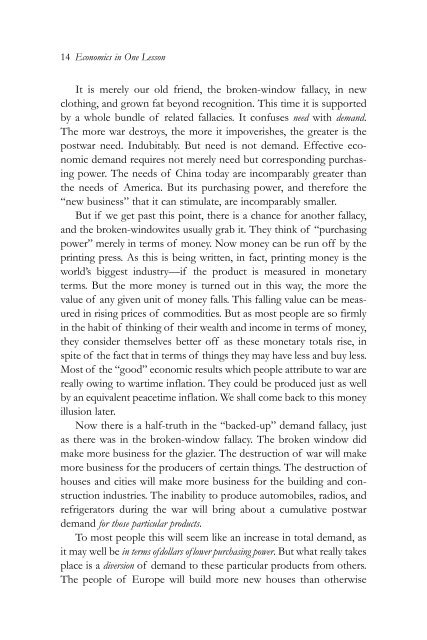1gDdM7w
1gDdM7w
1gDdM7w
- No tags were found...
You also want an ePaper? Increase the reach of your titles
YUMPU automatically turns print PDFs into web optimized ePapers that Google loves.
14 Economics in One LessonIt is merely our old friend, the broken-window fallacy, in newclothing, and grown fat beyond recognition. This time it is supportedby a whole bundle of related fallacies. It confuses need with demand.The more war destroys, the more it impoverishes, the greater is thepostwar need. Indubitably. But need is not demand. Effective economicdemand requires not merely need but corresponding purchasingpower. The needs of China today are incomparably greater thanthe needs of America. But its purchasing power, and therefore the“new business” that it can stimulate, are incomparably smaller.But if we get past this point, there is a chance for another fallacy,and the broken-windowites usually grab it. They think of “purchasingpower” merely in terms of money. Now money can be run off by theprinting press. As this is being written, in fact, printing money is theworld’s biggest industry—if the product is measured in monetaryterms. But the more money is turned out in this way, the more thevalue of any given unit of money falls. This falling value can be measuredin rising prices of commodities. But as most people are so firmlyin the habit of thinking of their wealth and income in terms of money,they consider themselves better off as these monetary totals rise, inspite of the fact that in terms of things they may have less and buy less.Most of the “good” economic results which people attribute to war arereally owing to wartime inflation. They could be produced just as wellby an equivalent peacetime inflation. We shall come back to this moneyillusion later.Now there is a half-truth in the “backed-up” demand fallacy, justas there was in the broken-window fallacy. The broken window didmake more business for the glazier. The destruction of war will makemore business for the producers of certain things. The destruction ofhouses and cities will make more business for the building and constructionindustries. The inability to produce automobiles, radios, andrefrigerators during the war will bring about a cumulative postwardemand for those particular products.To most people this will seem like an increase in total demand, asit may well be in terms ofdollars oflower purchasing power. But what really takesplace is a diversion of demand to these particular products from others.The people of Europe will build more new houses than otherwise


